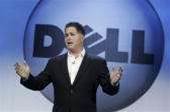
The two companies will combine salesforces in selling Emerson's XD cooling system and offer joint data centre assessments. Dell servers will also be certified for use with Emerson's cooling technologies.
The firm project 30 to 50 per cent power savings or an 80 per cent increase in system performance.
Current data centre cooling systems pump air through floor tiles, referred to as peripheral cooling. But, as the cold air travels from the floor to the server, it loses a large part of its cooling capacity.
The XD system uses liquid cooling that relies on refrigerants commonly used in consumer refrigerators and cars.
The cooling is delivered directly to the cooling coils on the server or server cabinet through a network of hoses attached to outlets in the ceiling.
Emerson has been shipping its XD system since 2001 and has installed it at about 300 sites and 6,000 server racks.
It was initially used mostly by high performance computing customers, but Fred Stack, vice president of marketing at Emerson subsidiary Liebert Corporation, admitted that adoption is relatively low.
"It is a conservative industry that has focused more on performance than on efficiency," he said.
The majority of Liebert's customers use the technology to retrofit existing server rooms because they hit a ceiling in the power supply that they can bring into their data centres for cooling and powering servers.
Increasing the cooling efficiency frees up power that can be used to install additional servers, Stack said.
"This allows them to have more space. It frees up energy to go to the servers and not the support such as cooling," he said.
The XD cooling system is about 20 per cent more expensive than alternative technologies. But users recoup the costs by installing up to four times as many servers in the same space.
Emerson designed a liquid cooling system for IBM and has worked with HP on its Dynamic Smart Cooling technology unveiled in November.
The HP technology uses a network of sensors to determine hotspots in the room and adjust the cooling loads automatically. When HP unveiled the technology, it claimed power cost savings of up to 40 per cent.
HP is currently rolling out the technology in its own data centres, but it has not yet been shipped to any customers, said Stack.
Liquid server cooling is not new. But most other major server vendors are reluctant to engage in such a deep partnership because they have their own consulting businesses.
"Dell is recognising that it is behind on the services side," noted Stack.


_(22).jpg&h=140&w=231&c=1&s=0)
_(28).jpg&h=140&w=231&c=1&s=0)
.png&h=140&w=231&c=1&s=0)



_(26).jpg&w=100&c=1&s=0)

 iTnews Executive Retreat - Security Leaders Edition
iTnews Executive Retreat - Security Leaders Edition












_(1).jpg&h=140&w=231&c=1&s=0)



